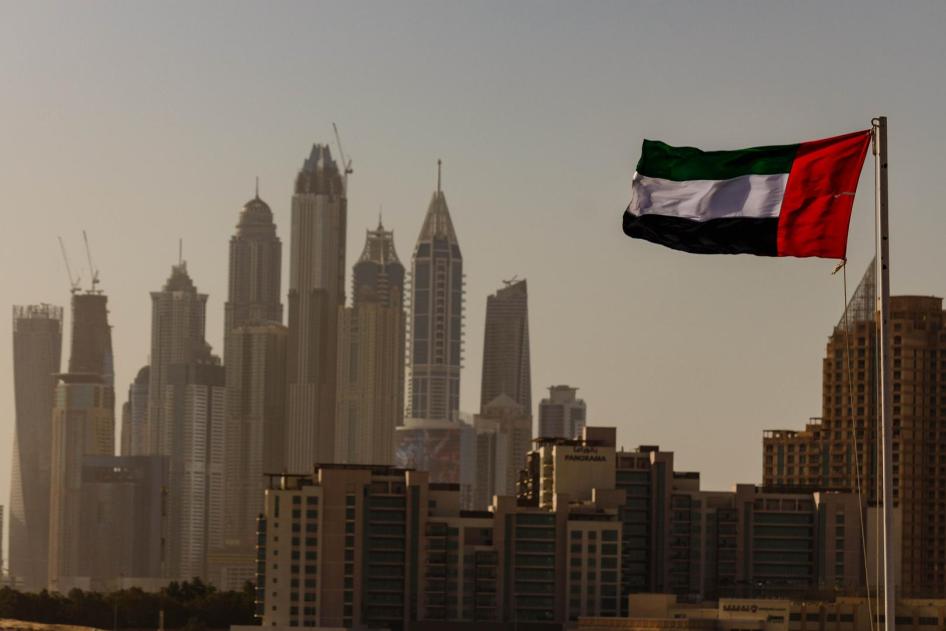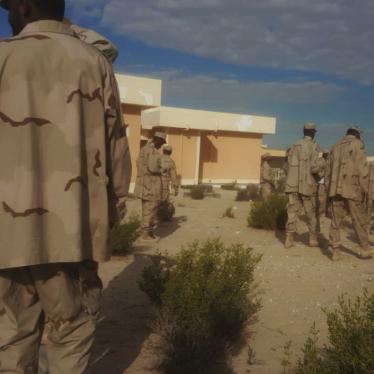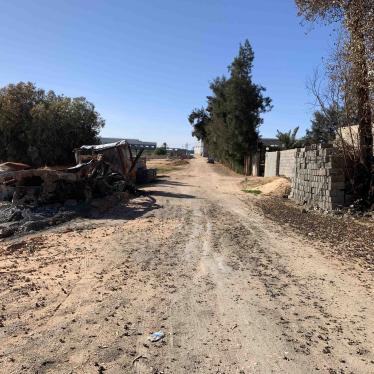(Washington) – The United States should halt proposed weapons sales to the United Arab Emirates (UAE), Human Rights Watch said today. It should suspend all future sales until the UAE curtails unlawful airstrikes in Yemen and Libya, halts support and weapons transfers to abusive local forces, and credibly investigates previous alleged violations in both countries.
On November 10, 2020, the US State Department formally notified the US Congress of the administration’s intent to sell the UAE US$23.37 billion in weapons, including F-35 fighter jets, unmanned aerial vehicles, as well as air-to-air and air-to-ground munitions. It cited the UAE’s need to defend itself from Iran as well as the UAE’s diplomatic agreement to normalize relations with Israel.
“In continuing to sell weapons to the UAE, US authorities are ignoring pervasive evidence of airstrikes and other attacks by the Saudi and UAE-led coalition in Yemen that unlawfully killed civilians,” said Sarah Holewinski, Washington director at Human Rights Watch. “US officials’ desire to reward the UAE for recognizing Israel should not entail complicity in unlawful deaths in Libya and Yemen.”
Given extensive documentation of the UAE’s repeated and ongoing unlawful attacks in Yemen and Libya and its direct support for abusive local forces in both countries, US State Department officials risk complicity if they approve the supply of arms that are then used in the commission of war crimes, Human Rights Watch said. On November 18, three US senators introduced resolutions of disapproval to block the proposed sales.
Since March 26, 2015, the UAE has played a prominent role in a coalition of countries that has conducted military operations in Yemen, including committing over 30 fighter jets to carry out airstrikes and naval ships to enforce the coalition’s maritime blockade. Since the start of the conflict, Human Rights Watch has documented at least 90 apparently unlawful coalition airstrikes, which have hit homes, markets, hospitals, schools, mosques, and detention centers. Some of the attacks may amount to war crimes. The Yemen Data Project, which compiles information on air strikes and other attacks based on open-source information, estimates that the Saudi and UAE-led coalition has conducted more than 22,180 airstrikes on Yemen since the war began, an average of over 10 attacks per day.
In a September 2020 report on the human rights situation in Yemen, the UN Group of Eminent International and Regional Experts on Yemen identified senior UAE military officials in its “mapping of main actors” alongside military officials from Saudi Arabia, the Yemeni Government, the Houthis, and armed groups in the south and along the western coast that are directly supported by the UAE.
In 2018, the coalition bombed a wedding, killing 22 people, including eight children, and in another strike bombed a bus filled with children, killing at least 26 children. Human Rights Watch has identified remnants of US-origin munitions at the site of more than two dozen attacks, including the 2018 attacks on the wedding and the bus.
In 2017 and 2018, the UAE led coalition operations to retake areas on the western coast, including Hodeida. Despite removing its ground forces from southern Yemen in late 2019, the UAE continues to support abusive local forces that have arbitrarily detained, forcibly disappeared, tortured, and abused dozens of people during security operations, including by transferring weapons to these forces. According to the Group of Experts, despite the withdrawal of ground forces, the UAE has “continued its air operations, and some 90,000 United Arab Emirates-backed Yemeni fighters remain on the ground in Yemen.”
In 2019, CNN reported that US-made weapons sold to the UAE were later transferred to abusive local forces, including a half dozen MRAP all-terrain vehicles manufactured in Texas transferred to the “Giants Brigade,” an abusive local militia allied with UAE-backed forces fighting on the west coast of Yemen.
The UAE is also a party to the ongoing conflict in Libya. It has conducted airstrikes and drone strikes, established a forward operating base there, and has provided direct support to the armed group known as Libyan Arab Armed Forces (LAAF, formerly the Libyan National Army), led by Khalifa Hiftar, including transfers of weapons, ammunition, armored vehicles, and other military equipment.
In April, Human Rights Watch identified an apparently unlawful drone attack carried out directly by the UAE that hit the Al-Sunbulah biscuit factory in Wadi al-Rabie on November 18, 2019, killing eight civilians and wounding 27. In July 2019, an apparently unlawful air strike by the UAE on a detention center for migrants under the control of the Government of National Accord’s Interior Ministry killed over 53 people, mostly African migrants.
The UN Panel of Experts on Libya has found in multiple reports, and most recently in a December 2019 report, that the UAE “routinely and sometimes blatantly supplied weapons” to the abusive armed group LAAF in violation of a two-way UN arms embargo on parties involved in the Libya conflict. The UAE weapons transfers to the Hiftar forces identified by the Panel of Experts include an offshore patrol vessel, armored personnel carriers, high explosive laser-homing projectile rounds, air defense systems, and drones. The panel found that the UAE conducts drone strikes in Libya on behalf of the LAAF which have killed civilians and did not respect the principle of proportionality under international humanitarian law.
Human Rights Watch has repeatedly documented violations by the LAAF, including summary executions, enforced disappearance, torture, desecration of corpses of opposing fighters in eastern Libya between 2014-2018 and more recently during the battle for Tripoli in May, as well as unlawful airstrikes, including an apparently unlawful airstrike on a residential neighborhood of Tripoli in October 2019 that killed civilians. Human Rights Watch has also documented use of internationally banned cluster bombs and antipersonnel landmines and booby traps by LAAF fighters and affiliated foreign forces in the southern districts of Tripoli during the latest Tripoli conflict.
Despite evidence of unlawful attacks and support for abusive local forces, the United Arab Emirates has not announced any investigations into specific attacks or held military officials accountable. In August 2016, the Saudi and UAE-led coalition announced the first results of the coalition’s recently created investigative mechanism, the Joint Incidents Assessment Team (JIAT), which has a mandate to investigate the facts, collect evidence, and produce reports and recommendations on “claims and accidents” during coalition operations in Yemen.
In 2018, however, Human Rights Watch showed that the JIAT has failed even in its limited mandate to assess “claims and accidents” during coalition military operations, providing deeply flawed laws-of-war analyses and reaching dubious conclusions. The JIAT only evaluates airstrikes and has not investigated abuses by local forces supported by the coalition.
The European Parliament has passed resolutions calling for EU countries to adopt an arms embargo against Saudi Arabia. In 2018, the EU expanded this call to include other parties to conflict in Yemen, including the UAE.
“How many more UAE airstrikes using US weapons need to wreak havoc on civilians before the US says no more?” Holewinski said.
|
News Release
United States: Embargo Arms to the United Arab Emirates
Risk of Complicity in Unlawful Airstrikes in Yemen, Libya
Your tax deductible gift can help stop human rights violations and save lives around the world.
Region / Country
Most Viewed
-
June 3, 2025
“They’re Ruining People’s Lives”

-
January 25, 2024
“We’re Dying Here”

-
November 25, 2019
A Dirty Investment

-
April 27, 2021
A Threshold Crossed

-
November 19, 2012
Losing Humanity




